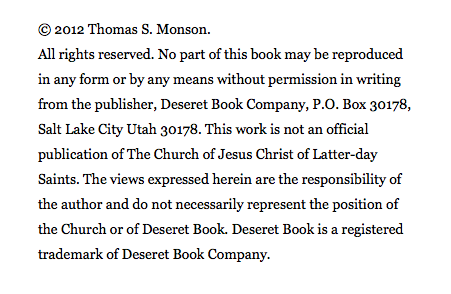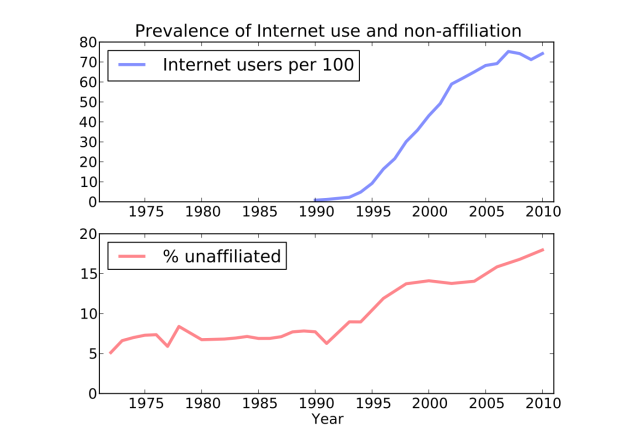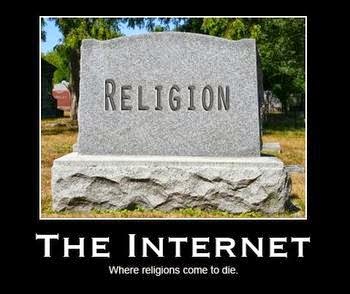God Reveals His Secrets to His Prophets
Amos 3; 7–9; Joel 2–3
LDS manual: here
Reading
Now we’re into the minor prophets, Amos and Joel. Like other prophets, they predicted death and destruction for those who didn’t believe them.
Ask: According to these passages in Amos, how will Jehovah / Jesus kill those who don’t obey him?
Amos 1:3 Thus saith the LORD; For three transgressions of Damascus, and for four, I will not turn away the punishment thereof; because they have threshed Gilead with threshing instruments of iron:
1:4 But I will send a fire into the house of Hazael, which shall devour the palaces of Benhadad.4:2 The Lord GOD hath sworn by his holiness, that, lo, the days shall come upon you, that he will take you away with hooks, and your posterity with fishhooks.
Answers: Fire and fishhooks.
By this time, God has had to resort to some pretty drastic measures to get Israel to worship him, including “cleanness of teeth” (or famine), drought, blasting, mildew, worms, pestilence, and the sword.
4:6 And I also have given you cleanness of teeth in all your cities, and want of bread in all your places: yet have ye not returned unto me, saith the LORD.
4:7 And also I have withholden the rain from you, when there were yet three months to the harvest: and I caused it to rain upon one city, and caused it not to rain upon another city: one piece was rained upon, and the piece whereupon it rained not withered.
4:8 So two or three cities wandered unto one city, to drink water; but they were not satisfied: yet have ye not returned unto me, saith the LORD.
4:9 I have smitten you with blasting and mildew: when your gardens and your vineyards and your fig trees and your olive trees increased, the palmerworm devoured them: yet have ye not returned unto me, saith the LORD.
4:10 I have sent among you the pestilence after the manner of Egypt: your young men have I slain with the sword, and have taken away your horses; and I have made the stink of your camps to come up unto your nostrils: yet have ye not returned unto me, saith the LORD.
4:11 I have overthrown some of you, as God overthrew Sodom and Gomorrah, and ye were as a firebrand plucked out of the burning: yet have ye not returned unto me, saith the LORD.
They didn’t love you after all that?
4:12 Therefore thus will I do unto thee, O Israel: and because I will do this unto thee, prepare to meet thy God, O Israel.
If God says he wants to meet you, tell him “no thanks”.
There is one interesting thing about Amos, though: Jehovah / Jesus is turning his talent for death and destruction toward social justice issues. In particular, Amos is riled about Israel’s treatment of the poor, and bribery.
5:11 Forasmuch therefore as your treading is upon the poor, and ye take from him burdens of wheat: ye have built houses of hewn stone, but ye shall not dwell in them; ye have planted pleasant vineyards, but ye shall not drink wine of them.
5:12 For I know your manifold transgressions and your mighty sins: they afflict the just, they take a bribe, and they turn aside the poor in the gate from their right.
For those in a real Gospel Doctrine class: Does anyone mention the poor? If they do, does a class member immediately rush to qualify this with a comment about “the deserving poor”? Does the teacher encourage class members to do anything individually to combat poverty, or are the steps taken by the church (e.g. fast offerings, church welfare) generally seen as sufficient? I’d welcome your answers in comments.
This lesson also looks at Joel. But no one cares about Joel. Seriously.
Joel 1:15 Alas for the day! for the day of the LORD is at hand, and as a destruction from the Almighty shall it come.
Oh, whatever, Joel. People might do better listening to these guys.
Prophet Three is my favourite.
Main points from this lesson
There’s one scripture that the entire lesson hangs on, and it’s about prophets.
3:7 Surely the Lord GOD will do nothing, but he revealeth his secret unto his servants the prophets.
Mormons love this scripture because it has the word ‘prophets’ in it, and it says that God is really into them. So let’s investigate prophets in the Mormon universe.
Mormon prophets do not prophesy
Here’s a quote from the real lesson manual.
“When I was a young wife and mother, my husband spent two years in the air force. We lived in military housing on Long Island, New York. While tending our young children, I often visited with neighbors who had come from all over the country. One day as a neighbor and I were talking about our beliefs, she became curious about what was different about The Church of Jesus Christ of Latter-day Saints.
“I told her briefly about the Restoration, and I explained that the restored Church of Jesus Christ has a living prophet today. This really seemed to pique her interest, and she wanted to know what the prophet had said. As I started to tell her about the Doctrine and Covenants and modern revelation, she said, ‘But what has he said lately?’ I told her about general conference and that the Church had a monthly publication with a message from the prophet. Then she got really interested. I was so embarrassed to admit that I hadn’t read the current message. She concluded our conversation by saying, ‘You mean you have a living prophet and you don’t know what he said?’ ” ( Janette Hales Beckham, “Sustaining the Living Prophets,” Ensign, May 1996, 84).
This neighbour was onto it, but more to the point: You have a living prophet, and he doesn’t prophesy? When was the last time a Mormon prophet made a prophecy? Presumably that’s part of their job.
Maybe I haven’t been paying attention, but the last time I can remember where an actual prediction was made was in the Proclamation on the Family.
…we warn that the disintegration of the family will bring upon individuals, communities, and nations the calamities foretold by ancient and modern prophets.
I think that if they’re going to say this kind of thing, they should go “full Old Testament”. In particular, they should specify the kind of calamities. Flood? Fire? Famine? Fishhooks?
It’s fishhooks, isn’t it?
So great is this tendency to avoid saying anything official, that even books by the current president of the church carry a disclaimer! Check out the front of A Prophet’s Voice by Thomas Monson:
It’s called A Prophet’s Voice, but the views “do not necessarily represent the position of the Church”? Whose voice would be considered authoritative, if not the prophet’s? Talk about having it both ways.
If there really were prophets, they would have far more responsibility than they take.
Let’s say you’re one of the Twelve Apostles. That presumably means you have the Holy Ghost — a member of the Godhead — with you all the time. You are also “in constant touch with Him who created this earth and knows the world from beginning to end.”
Ask: What problems would you be capable of solving, with that kind of access to the creator of the universe?
- Advance scientific knowledge
- Use information about the human body to eliminate disease
- Warn people about upcoming life-threatening events, like tsunamis, earthquakes, or hurricanes. People could use this information to save lives, carry out timely evacuation, and help with coordination of resources
- Foresee the consequences of policy decisions, and communicate them
Ask: What do Mormon prophets actually do?
- Make decisions about the church
- Give sleepy talks
- Guilt-trip men about porn
- Make up pithy aphorisms that people can put on graphics and share on social media
See, earthquake prediction is one thing, but that quote is really good, too. I like how it all begins with W.
If a god actually exists, and he speaks to people, then those people have some kind of responsibility to use that knowledge to do something besides promote their scammy religion-business. That they don’t do this speaks to either
- their lack of prophetic knowledge, or
- God’s lack of concern for the welfare of his children.
“We do not know.”
Okay, so for whatever reason, Mormon prophets don’t seem to be leap-frogging scientists in advancing human knowledge. But maybe this is unrealistic. Maybe prophets don’t involve themselves in temporal matters, just spiritual. But if that’s the case, they seem equally inept in answering spiritual questions.
Activity: Go to the corpus of General Conference talks and search for “do not know”
Ask: What kinds of things do LDS leaders say they “do not know” about? Here’s my list:
• Why do bad things happen to good people?
Why does a just God allow bad things to happen, especially to good people? Why are those who are righteous and in the Lord’s service not immune from such tragedies?
• Why did Eve’s sin result in sexism?
Now, Virginia, you call attention to the statement in the scriptures that Adam should rule over Eve. You ask why this is so. I do not know.
• What will be some of the effects of the Iraq War of 2003–2011? How will that affect the church?
Great forces have been mobilized and will continue to be. Political alliances are being forged. We do not know how long this conflict will last. We do not know what it will cost in lives and treasure. We do not know the manner in which it will be carried out. It could impact the work of the Church in various ways.
• When’s Jesus coming back?
We do not know the precise time of the Second Coming of the Savior.
• Can you tell us anything about science, Book of Mormon archeology, or anything about conflicts between religion and science?
I do not know the details of the organization of matter into the beautiful world we live in.
I do not understand the intricacies of the Atonement, how the Savior’s sacrifice can cleanse all repentant people, or how the Savior could suffer “the pain of all men”.
I do not know where the city of Zarahemla was, as referred to in the Book of Mormon.
I do not know why my beliefs sometimes conflict with assumed scientific or secular knowledge.
Gee, what a shame there’s no way you could find these things out. With a prophet or something.
Even more tellingly, a knowledge of the Atonement seems outside their grasp.
- How the Atonement was wrought, we do not know.
- I do not know how our Savior actually performs the sanctifying miracle of the Atonement
- We do not know exactly how the Lord accomplished the Atonement.
For fuck’s sake, guys, this is the foundational doctrine of Christianity. You guys are professional Christianity-explainers. This is the one thing you should be clear on. And yet, you simply “do not know” how this is supposed to work. Is sin a real thing, and you have to use a sin-transfer-omatron? Or does God see Jesus suffer, and say, “Okay, that makes me feel better about all this. I can stand to have a relationship with the humans again”? They simply don’t know. And they seem satisfied with not knowing.
Read this text from a PBS interview with Jeffrey Holland about race and the priesthood. How many times does he say “we don’t know” why African-American men were denied the priesthood?
“One clear-cut position is that the folklore must never be perpetuated. … I have to concede to my earlier colleagues. … They, I’m sure, in their own way, were doing the best they knew to give shape to [the policy], to give context for it, to give even history to it. All I can say is however well intended the explanations were, I think almost all of them were inadequate and/or wrong.
… It probably would have been advantageous to say nothing, to say we just don’t know, and, [as] with many religious matters, whatever was being done was done on the basis of faith at that time. But some explanations were given and had been given for a lot of years. … At the very least, there should be no effort to perpetuate those efforts to explain why that doctrine existed. I think, to the extent that I know anything about it, as one of the newer and younger ones to come along, … we simply do not know why that practice, that policy, that doctrine was in place…
[when asked to specify the folklore] Well, some of the folklore that you must be referring to are suggestions that there were decisions made in the pre-mortal councils where someone had not been as decisive in their loyalty to a Gospel plan or the procedures on earth or what was to unfold in mortality, and that therefore that opportunity and mortality was compromised. I really don’t know a lot of the details of those, because fortunately I’ve been able to live in the period where we’re not expressing or teaching them, but I think that’s the one I grew up hearing the most, was that it was something to do with the pre-mortal councils. …
But I think that’s the part that must never be taught until anybody knows a lot more than I know. … We just don’t know, in the historical context of the time, why it was practiced. …That’s my principal [concern], is that we don’t perpetuate explanations about things we don’t know. …We don’t pretend that something wasn’t taught or practice wasn’t pursued for whatever reason. But I think we can be unequivocal and we can be declarative in our current literature, in books that we reproduce, in teachings that go forward, whatever, that from this time forward, from 1978 forward, we can make sure that nothing of that is declared. That may be where we still need to make sure that we’re absolutely dutiful, that we put [a] careful eye of scrutiny on anything from earlier writings and teachings, just [to] make sure that that’s not perpetuated in the present. That’s the least, I think, of our current responsibilities on that topic. … “
It’s good to admit when you don’t know something. However, it’s strange that the Lord who “doeth nothing but he revealeth his secret unto his servants the prophets” leaves those prophets with such embarrassing omissions.
Another: Why was God, who knew Joseph Smith was going to be killed, so fuzzy on who his successor should be? Isn’t that something that should have been revealed, so as to prevent the arising of splinter movements?
They want to promote themselves as sources of divine knowledge, but when it comes down to it, they peep, “We don’t know.” I want to repeat this: not only is religon no better than random chance at coming up with answers to temporal questions, it’s equally inept at coming up with answers for things in its own domain.
This leads us to an inexorable conclusion:
Having a prophet is a stupid and unreliable method of getting truth.
Let’s say you’re a god. You have a lot of spirit children (that’s us humans), and you want them to live with you for eternity. You’ve also decided that those who aren’t with you either have to live forever in Outer Darkness, or in varying degrees of separation from their eternal family. You know, for some reason. So this is serious stuff.
You’ve also decided, for some reason, that a key criterion for their salvation is whether they believe in you.
Let me just stop here and say that this is really odd. Why would belief be the key criterion? For an imaginary god, this would matter, since lack of belief kills imaginary gods. But for a real god, it wouldn’t matter whether people believed in her or not.
But anyway, you want to make sure that as many of your spirit children as possible believe in you. How would you go about this?
- Appear to a large number of people, in some way that is easily verifiable.
- Appear to one guy in one place, who no one is going to believe.
If you chose number two, you’ve chosen the least effective method, and the one also chosen by Jehovah / Jesus.
Why wouldn’t God try to communicate his existence as unambiguously as possible? Does he not want to be believed? Remember — the eternal salvation of his spirit children is on the line. Why is he being so cagey about verifying his existence? Why would he take the risk of making himself look like one man’s delusion?
The answer that Mormons typically give is faith. God doesn’t prove that he exists because he wants us to have faith in him (for some reason). Here’s LDS apologist Daniel Peterson with a representative quote:
Likewise, if God were to reveal himself directly and conclusively, he would destroy our freedom, so overwhelming would that revelation be.
Destroy our freedom! Gosh! That’s why he has to make his existence seem ambiguous. In fact, he could take it one step farther, and make himself as unbelievable as possible, in order to find those who have truly been able to bypass the rational mind and rely on faith 100%. (Which would explain several things about the LDS Church.)
But this is poppycock. When God was supposed to have appeared so unambiguously to Moses, did that destroy Moses’ agency? Did God appearing to Joseph Smith destroy his agency? Of course not. If God can appear to one person without destroying their agency, he can appear to multiple people in a verifiable way without destroying their agency. Or he could appear to everyone. Again, the salvation of billions is hanging in the balance.
Then believers try to have it two ways. On the one hand, they say, “God refuses to prove his existence because that would destroy agency.” On the other, they play up the resiliant nature of skepticism and doubt: “You could show people the Golden Plates, and they still wouldn’t believe you!” Which is it?
There is no reason for a god to work this way. There is, however, a very good reason for a person to work this way: pretending to be a prophet gives you a certain credibility among the credulous. Many people have made lucrative careers out of pretending to have God’s phone number.
Fortunately, the LDS Church is dropping the whole cumbersome prophet thing, and transitioning to using arguments from professional apologists, sending out PR flacks to deal with the media, and releasing carefully-worded statements via the First Quorum of the Newsroom.
Additional teaching ideas
No technology without the Restoration?
Mormons are happy to use technology when it benefits them. However, in this lesson the manual takes it a step farther, and claims that technological progress was explicitly designed to further the LDS Church.
You may want to read the following statement from Elder Joseph Fielding Smith to help class members understand the great benefit of these inventions in performing the work of the Lord:
“I maintain that had there been no restoration of the gospel, and no organization of the Church of Jesus Christ of Latter-day Saints, there would have been no radio; there would have been no airplane, and there would not have been the wonderful discoveries in medicine, chemistry, electricity, and the many other things wherein the world has been benefited by such discoveries. Under such conditions these blessings would have been withheld, for they belong to the Dispensation of the Fulness of Times of which the restoration of the gospel and the organization of the Church constitute the central point, from which radiates the Spirit of the Lord throughout the world. The inspiration of the Lord has gone out and takes hold of the minds of men, though they know it not, and they are directed by the Lord. In this manner he brings them into his service that his purposes and his righteousness, in due time, may be supreme on the earth.
“ . . . I do not believe for one moment that these discoveries have come by chance, or that they have come because of superior intelligence possessed by men today over those who lived in ages that are past. They have come and are coming because the time is ripe, because the Lord has willed it, and because he has poured out his Spirit on all flesh” (in Conference Report, Oct. 1926, 117).
In other words, technological advancements happen, not because people think, work, experiment, and struggle through the creative process, but because some Bronze-age Hebrew tribal deity twiddles their brains without them knowing, and — whaddaya know! — airplanes and Internets. This man — who never created anything but silly explanations — takes everything people have made, and attributes it to his myth. What a sad trivialisation of human achievement.
But then let’s remember that this is a guy who typically underestimated the power of human thinking.
We will never get a man into space. This Earth is man’s sphere and it was never intended that he should get away from it.
The moon is a superior planet to the Earth and it was never intended that man should go there. You can write it down in your books that this will never happen.
Apostle Joseph Fielding Smith at Stake Conference in Honolulu, May 14, 1961
And this is why Mormons like to say that television, radio, and the Internet were actually invented by God to spread the Mormon gospel.
“…100 years ago, people still traveled by horse and buggy. The age of the telephone and electricity was just dawning. There was no air travel, no E-mail, no fax machines, no Internet. There has been an explosion of secular knowledge. I believe that God has opened up these treasures of intelligence to enhance His purposes on the earth.”
If God (and not Al Gore) really did invent the Internet, maybe he should have thought again. The Internet is a factor in the demise of religions worldwide.
Ask: How has the Internet helped you in your deconversion?
Possible answers:
- By making information possible, especially information about the real history of the church
- By helping to form alternative communities with different interests, making the church community less appealing
- By connecting us with people who offer support when we’re faced with the loss of our families and social group as a result of deconversion
- By facilitating scientific knowledge through allowing collaboration
We are living in a time when more information is more available than ever before. Tellingly, the church has not benefitted from it.
Are we as concerned about poverty as Amos is?
Many of us used to donate to the LDS Church through tithing and fast offerings. If you are no longer donating to the church, have you taken any compensatory steps to alleviate poverty through your own giving?
Atheists are sometimes criticised for donating less to charities. This may be skewed, if religions automatically qualify as charities just for promoting a religion, whether they actually help anyone or not (which is the case in Australia) . But we could all be doing more than we do.
Here are some lists of secular charities:
When I stopped paying the church, and dumped my World Vision kid, I decided that I wanted to contribute to secular charities instead. My list skews a bit Australian; yours can reflect where you live.
Do you have worthy causes others should know about? Put them in comments.







Recent Comments